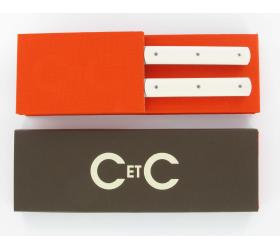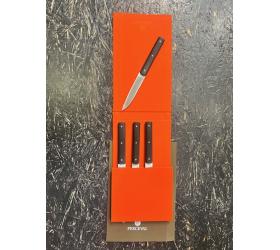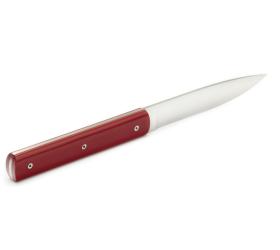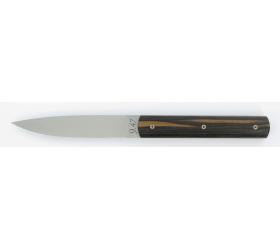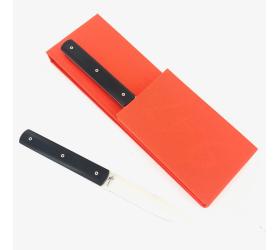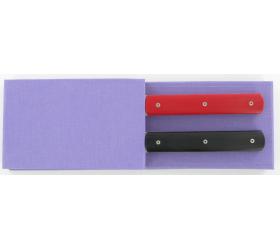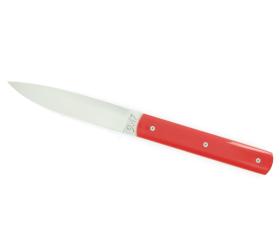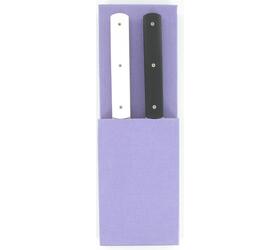You have no items in your shopping cart.
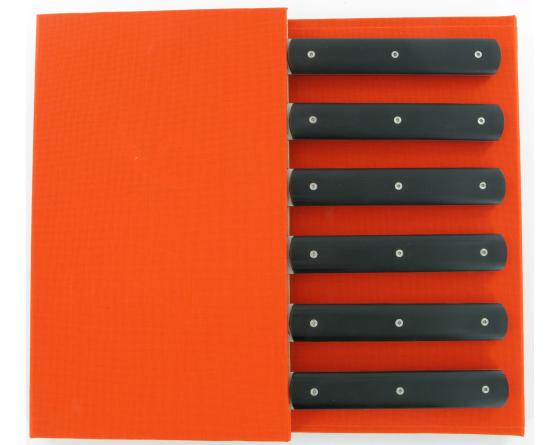
6 pieces Box - Français 9.47 Black Handle Perceval - Thiers - 16132
Table Knife by Perceval
Le Français 9.47
Black POM Handle
10,7 cm Blade
-
 Made in Thiers (France)
Made in Thiers (France)
-
 Stainless Steel
Stainless Steel
-
 POM Handle
POM Handle
-
 High Quality Steel
High Quality Steel
Customisation
Engrave the blade or the handle of your knife for a personalized gift
Description
Le Français 9.47 - Table Knives
Box-Set of 6 Pieces
Handle made with POM (Polyacétal) anti UV, screw-mounted with Allen screws (stainless steel)
Total Dimension : 21,7 cm
Blade Length : 10,7 cm
Blade Width : 1,9 cm
The blade is made with 12C27 Stainless Steel - Sandvik - Cryogenic Quenching (Rockwell Hardness : 57HRC)
Perceval Cutler make pocket knives, table knives. Based in Thiers, the historical capital of french cutlery, Perceval workshop make handmade modern and design knives in line with the cutlery savoir faire but including modern cutting technique and steel treatments.
Authentic handmade knives make in our workshop in the respect of the savoir faire. Perceval make knife top of the range. According to your wish or your need, you could find table knives, folding knives, knife for outdoor, professionnal knives and accessory around the knife.
They say that if you want something done, it's always best to do it yourself: in 2005, to fill a gap, Yves Charles, a Michelin-starred chef in Paris, went to Thiers with the aim of developing for his restaurant a novel cutting object, a table knife that would combine the qualities of the famous Perceval "folding knife" that was in his pocket. A unique "Français" model made out of the very best quality steel. For the most renowned cutlers, the table knife is still seen as the "poor relation" of the range; it is produced in series of six, using materials that have a less accurate quenching and a more impersonal appearance. Yves Charles wants only the best for his restaurant and upsets the tradition. A second visit to the Perceval cutlery workshop only serves to strengthen his resolve while at the third visit, never one for half-measures, the former client takes on the management of operations by purchasing the company founded in 1996 by Eric Perceval.
The aristocracy of the table knife was thus born with the arrival of the 9.47, the folding blades of which are made out of Swedish steel. As soon as the design was up and running, Yves Charles furnished his restaurant tables with this model which quickly became popular with diners. For many people, from the mistress of the house to Michelin-starred chefs alike, this would now be a case of "the 9.47 or nothing".
Once his investments started to give a good return, the business leader was then free to develop the potential that he had detected in this workshop by adapting cutting-edge technologies for use with an ancestral skill and know-how. The success has been such that he now had to choose between his restaurant and Perceval. The appetite for challenge and commitment came down in favor of the latter, and from 2008 he decided to devote all his energy to Perceval.
The talent of Yves Charles lies in combining the outlook of an artisan business with solid regional ties with the more cross-sectoral approach of this new century. He succeeded in the dual achievement of creating a desire for an object that had hitherto been virtually ignored, and offering Thiers a global showcase. Today, table knives, along with the most luxurious folding knives, are one of the "must haves" and, just like a fashion designer, Yves Charles recently brought out an exclusive model for a famous and very popular butcher in Paris.
The success of Perceval, that is seeking to stamp its mark on the sector, is driven by a dedicated team of professionals. A team of cutlers that works alongside Yves Charles to create objects of ever greater reliability and aesthetics, day after day communicating their love of their profession to apprentices who, in time, will also pass on their skills.
Do you know where the name "9.47" originally comes from?
This is a story about both food and wine.
In late 2004, a few friends were enjoying a meal prepared by Yves Charles in his restaurant and were just about to tuck into an excellent duck magret. Some of them had taken out their own knives, "Français" knives made by Perceval, while the others used those laid out on the tables. It was immediately apparent that while the pocket-knives sliced through the meat with ease, the restaurant knives made the work far more painstaking and laborious.
Yves exclaimed: "How come we can't find any table knives on the market that match the cutting power of these "Français" knives?"
This question spawned the idea of focusing on a knife's original function: its cutting power. A table knife should be designed with just as much care as a pocket-knife.
After many rewarding discussions on this project over the course of the evening, we decided that this knife would have the same profile as the model that had inspired it. We have to admit that a fair amount of this creative energy was generated by the wine shared between the friends during their meal. An early-to-market (primeur) wine with a 9.47° alcohol content, produced by one of the guests: Stéphane Majeune from the Peyra. A wine that would ultimately give the knife its name: the 9.47.



